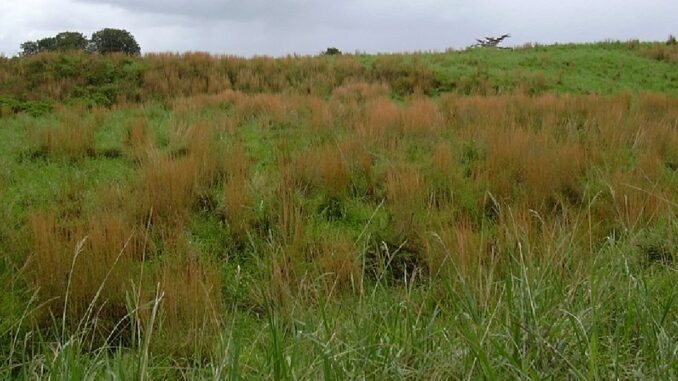
Weeds rarely get any respect, which is a shame because some of them may hold the keys to a healthier future for countless humans. One of those “weeds” is Andropogon virginicus.
A perennial grass, it grows as much as 2.1 meters (7 feet) tall. Also known as broomsedge bluestem, yellowsedge bluestem, and whiskey grass (because whiskey bottles imported into Australia from America in bygone days were packed in the grass for shipment), it is native to the southeast United States. Due to its invasive nature it can be found as far north as the Great Lakes, and has found its way to California, Hawaii, Japan, and Australia, none of whom want it growing in their territory. However, it has proven difficult to kill. Burning A. virginicus causes it to grow back stronger. When it dies naturally, it releases persistent herbicidal chemicals into the ground to kill competing species (in a strategy known as allelopathy). Grazing livestock find it unpalatable and less nutritious than other grasses, which makes A. virginicus detrimental to agriculture and of no economic value. It is prolific, with high seed survival and germination rates, and it thrives in a wide-range of conditions and habitats, even in poor soils.
Can there be any redeeming qualities for this weed? Yes, according to the research team at Hiroshima University, who published their paper in a special edition of the science journal “Plant”, subtitled, “Biological Activities of Plant Extracts”.
The scientists extracted “promising sources of antioxidant, anti-diabetic, anti-tyrosinase, and antitumor agents”. Flavonoids from the plant provide antioxidant and anti-inflammatory properties. Additionally, the team discovered other extracts to be effective against chronic myelogenous leukemia, and Type 2 diabetes.
Although A. virginicus is not in any way an endangered species, it is a prime example of a plant thought to be worthless, detrimental, and targeted for destruction, turning out to possess healing properties that will benefit countless individuals. The moral of this tale is that humans should not destroy anything simply because it appears to lack value. What we don’t know can, and will, hurt us.
Question of the Night: How well do you get along with plants? Do you have a green thumb?
